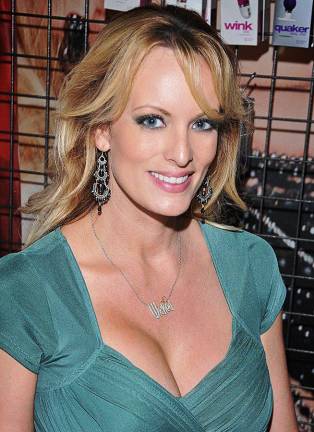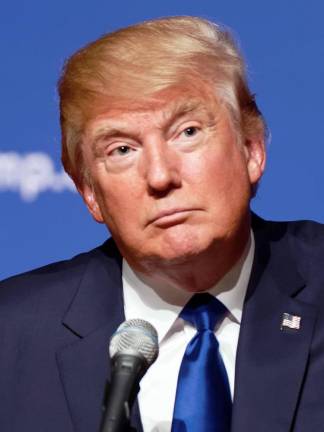Judge Rules That Trump Hush Money Payment Case Stays in NY State Court for Now
Former President Donald Trump had argued that the case should be moved to federal court because he was acting in his capacity as president in the case which involves hush money payments he made to a porn star and to a former Playboy model prior to his election in 2016. A federal judge rejected the argument. The former president was indicted in state court on charges that he falsified business records to cover up payments to port star Stormy Daniels and Playboy model Karen McDougal.


NEW YORK (AP) - A federal judge in New York City signaled Tuesday that the state criminal hush money prosecution of former President Donald Trump will soon be returned to state court because Trump cannot prove that he was acting in his capacity as president when he made payments to his private attorney.
Judge Alvin K. Hellerstein said he saw “no relationship to any official act of the president” in the actions cited in a prosecution that led Trump to plead not guilty in state court in April to 34 felony counts of falsifying business records to hide 2016 hush money payouts to bury allegations of extramarital sexual encounters.
He said he’ll officially rule within two weeks on Trump’s effort to move the prosecution to federal court from state court.
The judge said there was “no reason to believe that an equal measure of justice could not be rendered by the state court.”
Trump was indicted on charges that he falsified records at his company to cover up payments made in 2017 to his former lawyer, Michael Cohen, to compensate him for orchestrating payouts to porn star Stormy Daniels and Playboy model Karen McDougal. Trump has denied having had affairs with either woman.
Trump’s lawyers have said those payments to Cohen were legitimate legal expenses and not part of any cover-up.
Before he made final remarks after a hearing lasting over three hours, Hellerstein made several comments indicating that to move the case, Trump needs definitive proof that he was acting in his capacity as president rather than tending to private affairs in his dealings with Cohen.
The judge said the argument by Trump’s attorneys that the private act of hiring Cohen and paying him out of his pocket was related to his official duties as president “sounds a little far fetched, but that’s the argument.”
Later, the judge noted that there was not much evidence of exactly what role Cohen served and what duties he performed to help determine whether what he did could be considered to be within Trump’s presidential duties.
“We have the invoices,” the judge said, referencing a year’s worth of monthly $35,000 payments to Cohen. “But no proof of what he did.”
The judge’s skepticism and his questions about why there were no witnesses prompted Todd Blanche, an attorney for Trump, to call a witness, Alan Garten, the Trump Organization’s chief legal officer, even though attorneys last week had agreed they would not call witnesses at the hearing.
Garten testified that he was among those who insisted that Cohen leave the Trump Organization when he began representing Trump as a personal lawyer once he became president in January 2017.
The Republican’s lawyers say the charges, while related to his private company’s records, involve things he did while he was president. U.S. law allows criminal prosecutions to be removed from state court if they involve actions taken by federal government officials as part of their official duties.
State prosecutors, though, say he can’t invoke official immunity for unofficial and private actions.
Trump’s lawyers sought to move the case to Manhattan federal court soon after Trump pleaded not guilty in April to charges that he falsified his company’s business records to hide hush money payouts aimed at burying allegations of extramarital sexual encounters.
While requests to move criminal cases from state to federal court are rarely granted, the prosecution of Trump is unprecedented.
The Manhattan district attorney’s office, which brought the case, has argued that nothing about the payoffs to either Cohen or the women involved Trump’s official duties as president.
If a judge agrees to move the case to federal court, Trump’s lawyers could then try to get the case dismissed on the grounds that federal officials are immune from criminal prosecution over actions they take as part of their official job duties.
Moving the case to federal court would also mean that jurors would potentially be drawn not only from Manhattan, where Trump is wildly unpopular, but also a handful of suburban counties north of the city where he has more political support.
In state court, a criminal trial was set for March 25 in the thick of the primary season before next year’s November presidential election.
Manhattan District Attorney Alvin Bragg pursued the case after Trump left office. He is the first former president ever charged with a crime.
Copyright 2023 The Associated Press. All rights reserved.